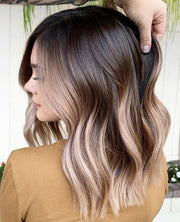
Our Pigmentation Must-Haves
Pigmentation is something that affects many people, but most of us don't know a lot about it.
Some products for skin lightening are either too harsh for the skin or just don't work, period. You may already know this because once you visit a dermatology clinic and consult with a specialist, one of the tips is to introduce new products into your skincare routine. What can be confusing is figuring out which are the best products to try since there are so many options out there.
The biggest thing to remember is that pigmentation is entirely natural and, unless your dermatologist is concerned for your health, entirely harmless. Pigmentation changes are something everyone experiences throughout their lifetime and represents an amalgamation of the body’s interactions with the world. Your pigmentation changes are as beautiful as the rest of you.
If you do want to find a product that may help to treat pigmentation changes, here’s where you’ll find the pigmentation-fighting heroes our team is obsessed with. We have compiled a small subset of products that have been very effective in treating pigmentation, and we want to share our recommendations with you here.
What is pigmentation?
Pigmentation is the production of melanin, the pigment that gives your skin, hair, and eyes their colour. It's produced by specialised cells called melanocytes. Pigmentation is a natural phenomenon, it’s what makes you tan in the sun, after all.
Pigmentation changes occur when melanocytes produce too much or too little melanin. They can affect any area of the body, but they most commonly affect the skin and hair. If you’re wondering how pigmentation effects the hair, think greys. So, as we age our pigment cell production slows, producing grey hair.
Generally, changes in pigmentation are divided into two categories:
Hyperpigmentation is an abnormal increase in pigment wherever there has been inflammation or injury to the skin. Common causes include acne scars, melasma (dark patches on the face), age spots and freckles.
Hypopigmentation is a lack of pigment in areas where it should normally appear. Hypopigmentation can be temporary or permanent and may affect a small area or cover large portions of the body. Causes include burns, laser treatments and vitiligo (loss of skin colour due to autoimmune disease).
What causes pigmentation?
There are many different types of pigmentation, some of which are genetic while others are not. The most common types include lentigo senilis (age spots), melasma (also known as the mask of pregnancy), chloasma, freckles and moles.
Uneven pigmentation
This is when the skin has uneven patches with different levels of colour. It's usually caused by genetics but can also be caused by sun exposure or hormonal changes during pregnancy or menopause, and birth control pills.
Melasma (chloasma)
Melasma is a condition where there are brown patches on your face that can appear before pregnancy or during pregnancy. Melasma is common in women and people with darker complexions who are pregnant or taking birth control pills with estrogen and progesterone hormones. It's most commonly found on the forehead, nose, cheeks, and chin.
Age spots (lentigines)
These are small flat spots that appear when pigmentation increases over time due to ageing and sun exposure. They're more common after age 50 and tend to appear on areas that were previously exposed to the sun (like your face).
Our pigmentation favourites
We’ve put together a list of our fave pigmentation products that are effective at keeping your skin healthy and giving you the self-care you deserve. Relax with these products and enjoy taking care of your skin.
Avène A-Oxitive NIGHT Peeling Cream - Vitamin A Moisturiser
Avène A-Oxitive Night Peeling Cream works while you sleep to boost natural cellular activity, detoxifying and evening out your skin texture. With just 2 simple steps, feel your skin renew its natural glow thanks to an optimal level of hydration.
This non-abrasive exfoliant contains the first skin renewal complex with gradual release Retinaldehyde, boasting all the benefits of Vitamin A for skin. Vitamin A is essential for the formation of new skin cells and if you don’t get enough of it, your skin will become dry and flaky. Vitamin A also helps to reduce the appearance of dark spots.
Apply every morning and evening to a cleansed face. For optimal results, apply Avène A-Oxitive Booster Serum after the cream.
Dermalogica PowerBright Dark Spot Serum
Dermalogica PowerBright Skin Brightening Serum contains a high-potency formula featuring advanced anti-dark spot technology. This advanced serum is designed to diminish the appearance of uneven pigmentation fast and will continue working to even your skin tone after application, with potent Niacinamide and Hexylresorcinol to help fade dark spots.
Murad Rapid Dark Spot Correcting Serum
Murad Rapid Dark Spot Correcting Serum is designed for the most stubborn dark spots and hyperpigmentation. This powerful, hydroquinone-free product promotes surface cell turnover to reveal a more even, brighter complexion. This innovative new generation of brightening ingredients has been expertly combined to tackle stubborn dark spots while treating your skin with the same care that a dermatologist would.
Skinstitut Even Blend Serum
The Even Blend Skinstitut range is formulated to chemically exfoliate and refine skin, fading pigmentation, age spots and uneven skin tone for a brighter, more balanced complexion. It uses the power of hydrolysed vegetable protein and trehalose to draw moisture into the pores, intensely hydrating and plumping the skin.
Shop these pigmentation faves and more at Oz Hair & Beauty today.
categories





